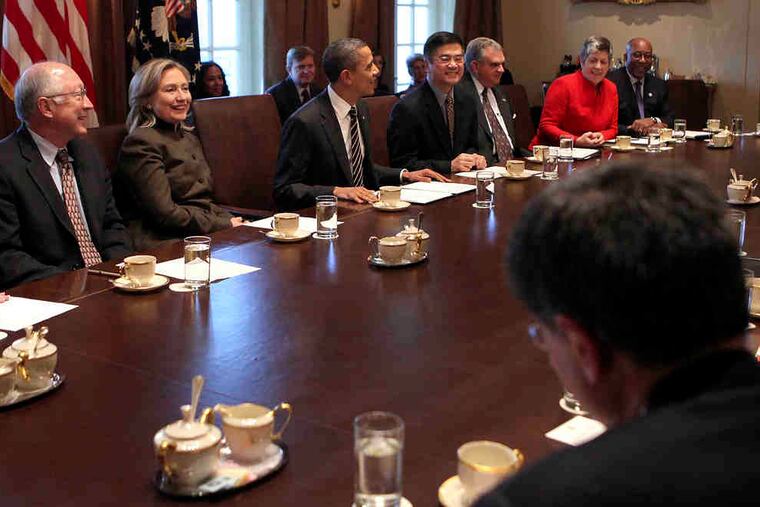PhillyDeals: Tax compromise would benefit old-money families
The richest Americans are watching President Obama's proposed tax compromise closely. Lower taxes mean they won't have to invest so aggressively, or risk as much - or create so many jobs.

The richest Americans are watching
President Obama's
proposed tax compromise closely.
Lower taxes mean they won't have to invest so aggressively, or risk as much - or create so many jobs.
At a recent New York meeting with the investment office of one of America's billionaire families, "we had our lunch at Le Cirque, and the theme of the lunch discussion was the redistribution of wealth in the United States," says John K. Hillman, founder and chief executive of Philadelphia Financial, an insurance investments firm that manages $3.5 billion for 350 family clients.
"Our clients are keenly focused on what is happening to their investment revenues, more than on whether the government is spending its revenues well," he told me.
"Old-money families who haven't had to work in three generations [and] who pay a disproportionate share of taxes are very much focused on what capital-gains rates are, what ordinary tax rates are, the estate tax."
The estate tax went to zero this year, enabling rich people to die and leave more of their assets to their heirs. Existing law would jump it to 55 percent for the richest Americans next year. Obama wants to reinstate the tax, but at a lower rate. Die in December, and your heirs may get a lot more of your money than if you hold on until January.
As Hillman says, this kind of uncertainty "makes it very difficult to do long-term strategic planning."
That's one reason there's an industry of firms like Philadelphia Financial that offer insurance pools and generation-skipping trusts and other devices to delay and lessen taxes.
If tax rates went up, wouldn't that force rich people to invest more aggressively in search of higher returns?
"Yes," Hillman told me. "When short-term [savings] is paying less than 1 percent," whether your capital-gains tax is 15 percent (as at present) or 39 percent (under a previous Democratic proposal), "it becomes a meaningful component of how you plan your investment strategy."
When tax rates are high, savers have to make riskier, more aggressive investments so they can still afford to live well.
But when tax rates fall, it's easier to do what many people with inherited wealth do naturally: Invest conservatively, in municipal bonds or other instruments that hardly risk your capital.
If this describes you, thank the Republican-leaning Congress, and Obama, for keeping you safe.
Double down
As with other real estate funds set up just before the property market collapsed, the $2 billion
Lubert-Adler Real Estate Fund VI
, set up by the Philadelphia partnership of
Ira Lubert
and
Dean Adler
, has so far lost a painful 41 percent of its initial value, according to the most recent report filed by one of its backers, the
Pennsylvania Public School Employees Retirement System
.
PSERS' $67 million investment in the fund in 2007 was worth just $40 million last time PSERS filed an estimate earlier this year.
But Lubert-Adler, like other big real estate players, has plans for climbing out of its hole. And New Jersey is here to help.
The New Jersey State Investment Council, which oversees pension money for state workers, teachers, and retirees, voted last month to give Lubert-Adler $100 million for its new $400 million Fund VI-B, "to acquire assets at significant discount through the distressed-debt opportunities provided by the current real estate market," director Timothy Walsh told council members in a memo.
Lubert-Adler will buy "discounted" loans from banks and other lenders, and, where necessary, help redevelop the properties so they can start making money again.
Lubert-Adler won't charge fees until June 2013, and "will not invest capital in legacy assets" that have already been written down in the firm's original Fund VI. New Jersey will name a director to watchdog the fund.
Delaware trust?
The Securities and Exchange Commission's Philadelphia office didn't identify the Wilmington law firm employing information systems and security manager
Jeffery J. Temple
, from 2002 until October of this year, in its 48-page insider-trading complaint against
Temple
and his brother-in-law
Benedict M. Pastro
.
But the document pointed straight at the state's biggest corporate law shop: Richards, Layton & Finger, which had a hand in each of the more than 20 deals Temple and Pastro are accused of trying to game.
Delaware's business-friendly Chancery Court is the preferred dispute-resolution center for more than half the Fortune 500 and other Delaware-registered corporations. Firms like Richards Layton work with giant New York, Philadelphia, and Washington law firms representing some of America's biggest corporate clients in Delaware disputes and settlements.
The SEC, which uncovered the insider trading through its tracking software, says Temple tried to get a piece of the action: Temple "traded in advance of at least 22 prospective mergers and/or acquisition-related announcements," and collected "illegal profits exceeding $88,300," with his brother-in-law doing a little better on fewer deals. The deals included Google's 2009 offer for On2 Technologies Inc.; Disney Co.'s acquisition of Marvel Entertainment; and Cisco's purchase of Starent Networks Corp., among others.
When I called, Richards Layton employees acknowledged Temple worked there. I left messages for senior partners, including the head of Delaware's bar association, asking what the case meant for firms that trust Delaware with their secrets.
The firm sent an e-mail statement: "The allegations of the complaint, if true, indicate knowing violation" of Richards Layton's confidentiality and stock-trades notification policies.
"The firm has cooperated fully with the federal government in its investigation, no attorneys or other employees of the firm were involved, and no harm to clients has occurred as a result of the alleged activity." Temple didn't return calls.